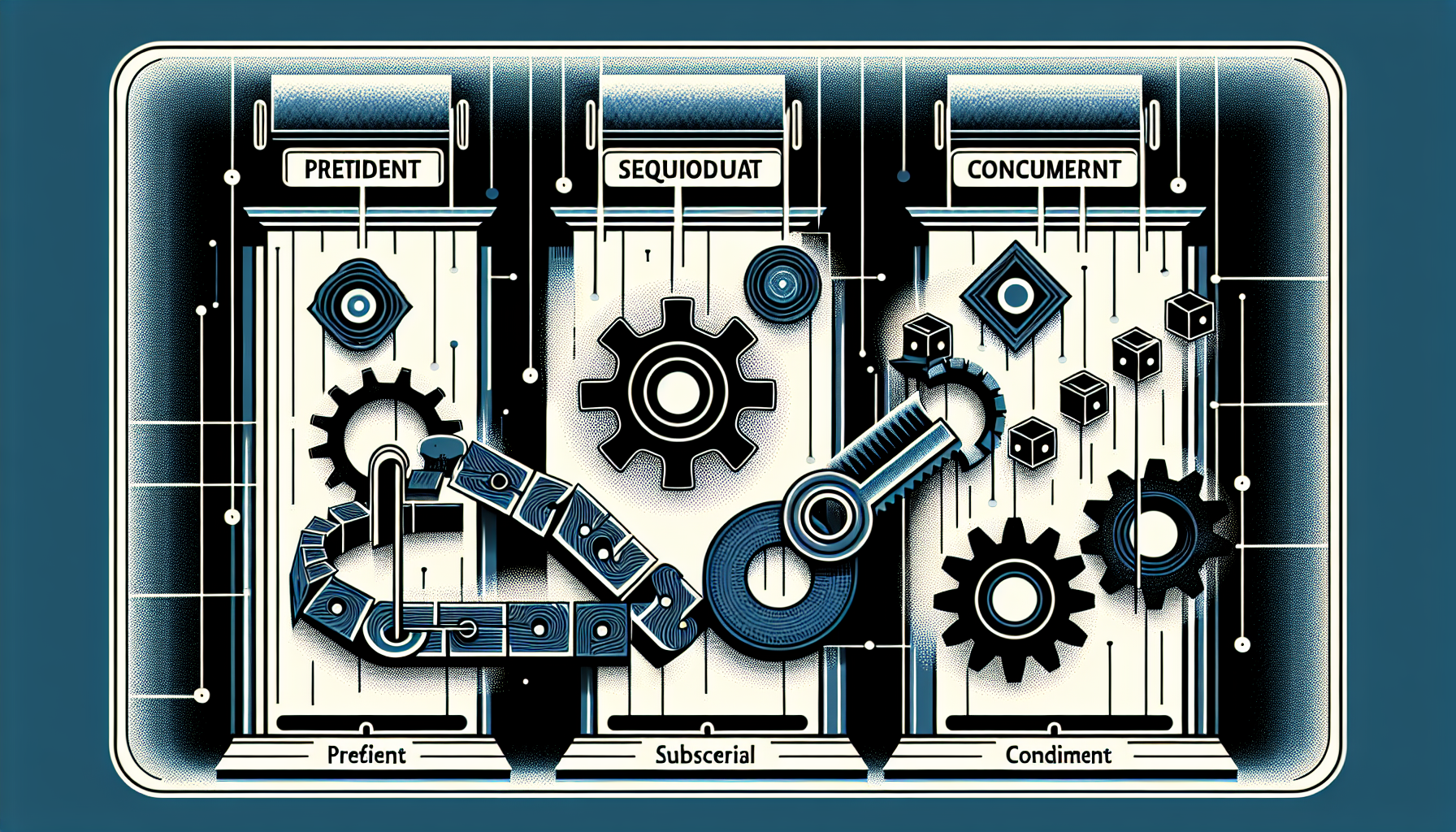Malcolm ZoppiWed May 08 2024
Understanding the Condition of Contract: An Essential Breakdown for Parties Involved
Wondering what ‘condition of contract’ actually means and why it’s non-negotiable in enforcing legal agreements? Contract conditions are the specific terms that must be satisfied for a contract to be considered fully executed and legally binding. Without them, there’s no playbook for what’s expected or when obligations kick in, opening the door to disputes and […]
Wondering what ‘condition of contract’ actually means and why it’s non-negotiable in enforcing legal agreements? Contract conditions are the specific terms that must be satisfied for a contract to be considered fully executed and legally binding. Without them, there’s no playbook for what’s expected or when obligations kick in, opening the door to disputes and confusion. This article uncovers the pivotal role of contract conditions, their enforceability, and how they’re crafted to align with business interests and legal standards.
Key Takeaways
Contract conditions are fundamental terms or elements that dictate the performance of an agreement and are enforceable by law, with key components including mutual assent, consideration, capacity, legality, explicit terms, implied terms, and constructive conditions.
The strategic crafting of contract conditions should align with business objectives and minimize disputes by using clear language and involving stakeholder engagement, aided by model clauses and standardized contracts to ensure clarity and legal enforceability.
Contract conditions are classified as precedent, concurrent, or subsequent, each serving a specific role in the performance and enforceability of contracts, with real-world applications demonstrating their importance in various sectors such as real estate and service agreements.
Essentials of Contract Conditions

In the realm of contract law, a variety of conditions exist as necessary prerequisites that compel a party to fulfill their contractual obligations. These conditions take the form of clauses, stipulations, and terms—all structured to protect the interests involved and secure enforceability under the law. Elements comprising these conditions may include mutual assent, adequate consideration, capacity to enter into an agreement, legality of subject matter along with both explicit and implied terms as well as constructive conditions.
Each component holds its significance within this legally recognized document—reinforcing its validity when applied through legal mechanisms.
Delving deeper into contract law unveils an understanding pertaining to these various elements. Recognizing how they contribute to contracts being considered binding agreements with enforceable expectations for each participating party.
We advise seeking legal advice.
What Constitutes a Condition in Contract Law?
In the realm of contract law, a contract condition is often viewed as the essential pillar of an agreement. It represents a critical term or component vital for fulfilling the obligations set forth in the agreement. Such conditions may be either expressly articulated within the context of the contract or inherently implied due to various factors such as nature, actions related to it, or specific circumstances tied to said contract.
For instance, express conditions are terms that have been clearly defined and serve to lay out particular responsibilities or specify triggers for performance. An express condition usually exists in written form within a contractual document and typically precludes ambiguities regarding its interpretation.
Conversely, there’s also what is known as an implied condition. These conditions remain unstated directly within a contractual text. They are presumed included owing to relevant characteristics pertaining to an agreement itself—the conduct associated with it—or resulting from unique situations surrounding its execution.
The Binding Nature of Contract Conditions
The enforceability of conditions within a contract is paramount, and the inclusion of standard conditions is essential for deeming an agreement legally binding between parties. A party must be satisfied with the fulfillment of these conditions for them to be upheld by law.
As an example, in order for a contract’s standard conditions to meet legal enforcement standards, they must comply with certain requirements such as offering valid consideration and ensuring that the subject matter of the contract is legal. It’s crucial that contract conditions are capable of being enforced if an agreement is to hold any weight under law.
Crafting Contract Conditions: A Strategic Approach

Formulating conditions for a contract is an intentional and meticulous endeavor. This process must align with specific targets and necessities that mirror the ambitions, regulatory adherence, and strategies to lessen risk within a business context. Contracts require unambiguous language to curtail possible disagreements while enhancing efficient management of risks.
Constructing clear-cut and accurate terms is critical in preserving the integrity, fairness, and legal soundness of a contract. It’s imperative to examine closely how key terms are crafted and ensure that these stipulations dovetail with overarching business aims.
Key Terms and Clarity in Drafting
The craft of creating a contract is in striking the right balance between technical legal terms and understandable everyday language. To reduce uncertainty and make contracts more easily understood, they should be composed using clear language with well-defined terminology. This technique strengthens rather than diminishes the legal effectiveness of the agreement by making its intent more accessible.
By incorporating elements from exemplary model clauses, standardized agreements, and ICC templates into your own documents, you can ensure that your contract conditions are precise and unambiguous. Legally enforceable express terms within an authentic contract may arise either from verbal negotiations or through written agreement.
Within electronic commerce scenarios, it’s critical for Terms and Conditions to cover key aspects such as:
conditions of sale
payment options
delivery procedures
cancellation policies
rights of consumers
These stipulations must comply with legislation designed to safeguard consumer interests.
Aligning Conditions with Business Objectives
In the realm of commerce, contracts are essential not only as legally enforceable agreements, but also as vital instruments reflecting and advancing business goals. Contracts that embed specific performance indicators within their provisions ensure activities are in sync with corporate aims, while rewards contingent on outcomes encourage adherence to these targets.
By defining clear expectations and a comprehensive Scope of Work, businesses can tailor contractual obligations to their strategic ambitions and challenges—this strategy effectively reduces risks and enhances understanding for all involved parties. It is equally important to have stakeholders from different departments contribute to contract formulation so that it underpins both individual departmental aspirations and broader company objectives.
To ensure continued congruence between the execution of a contract and shifting business strategies over time, instituting routine evaluations of contractual arrangements is crucial.
Types of Contract Conditions and Their Impact

Within the complex sphere of contract law, conditions are differentiated by their unique types and corresponding functions. These categories include conditions precedent, concurrent conditions, and subsequent conditions, all of which significantly influence the dynamics between contracting parties. By incorporating specific clauses such as those in conditional sales contracts or real estate agreements that address financing arrangements or property condition stipulations, can reduce conflicts and protect the interests of involved parties from unexpected occurrences.
To delve deeper into this subject matter, let’s scrutinize each type of condition and its particular effect on legal agreements.
Condition Precedent: Triggering Performance
Condition precedent clauses in contracts serve as the activation mechanisms for obligations to perform. They stipulate that certain conditions or situations must first be met before a party is required to fulfill their contractual duties. If such preconditions are not fulfilled, it can provide a valid defense against claims of contract breach.
Taking real estate transactions as an example, conditional sales agreements permit buyers occupancy rights post-effectuation of the contract on one key condition: that ownership remains with the seller until the buyer successfully obtains mortgage financing. With a financing contingency clause, buyers are granted a defined time frame within which they must secure loan approval. Failure to obtain this financing entitles them to cancel the agreement. These scenarios demonstrate how conditions precedent protect all parties involved by managing unforeseen developments and signaling when contracts should proceed forward into performance stages.
Condition Subsequent: The Escape Clause
Conditions subsequent serve as a means of retreat, in contrast to conditions precedent which initiate contractual obligations. Such a condition is embedded within the contract as a clause that allows for its termination under specific circumstances after it has been established. This escape provision permits the involved parties to dissolve their agreement and seek alternative solutions if such a condition arises.
At times, compliance with statutes like the Planning Act or securing registration for something such as a condominium might be set forth by the contract’s conditions. It may also necessitate acquiring an official statement from the Department of Finance at State level. A failure to adhere to these defined conditions subsequent could result in ending an already commenced contract. Hence, both understanding and mutual consent regarding clauses related to condition subsequent are vital in safeguarding all parties concerned in an agreement.
Condition Concurrent: Mutual Dependencies
Concurrent conditions mandate the simultaneous fulfillment of duties by the parties engaged in a contract. Obligations under such an agreement must occur at the same time for it to be considered legally binding. This requires each party’s actions or performances to coincide.
To maintain the legal enforceability of a contract with concurrent conditions, involved parties must synchronize their activities carefully to achieve mutual completion of obligations. A breakdown in this coordinated effort can impact whether the contract remains legally effective since these conditions hinge on joint performance from all contracting parties, thereby promoting coordination and reciprocal duty fulfillment within contracts.
Responding to Breach of Conditions

Even with diligent attention to the creation of contract conditions, violations can happen. Recognizing the correct course of action when a breach takes place is crucial. If a party violates a contract, the affected party may either choose to uphold the agreement and pursue compensation or acknowledge the breach as repudiation and proceed to end the contract. This decision requires assessing which kind of violation occurred and deciding on suitable legal measures and recompense.
Identifying a Breach of Condition
Comprehending the occurrence of a contract breach involves recognizing its specific type. Various forms of breaches exist, including:
Actual breach: when a party definitively fails to adhere to contractual obligations
Anticipatory breach: if a party indicates beforehand that they will not comply with the terms of the contract
Minor breach: an infringement that does not crucially hinder the comprehensive performance stipulated by the contract
Material breach: significant non-compliance affecting pivotal aspects and overall execution under the agreement
Repudiatory breach: so grave it entitles the innocent party to bring about termination of said agreement
With insight into these different types, one can better gauge both impact and repercussions emanating from any contravention related to conditions within a contract.
When confronted with minor infractions such as tardy or incorrect delivery concerning goods or services, it typically does not justify terminating contracts. In contrast, material violations which result in receiving something vastly disparate than what was originally settled upon do enable those who have adhered faithfully (the “innocent” parties) to cease honoring said arrangements while seeking appropriate redress. Identifying precisely what kind of infraction has occurred is crucial for determining how best to proceed in response.
Legal Recourse and Remedies
When a breach of contract is discovered, it is critical to identify an appropriate remedy. In such cases, courts can provide various legal responses that may include:
Monetary compensation: The court often awards compensatory or punitive damages as common remedies for breached contracts.
Contract termination
Enforcement of specific performance
Should financial restitution prove insufficient in adequately resolving the issue, the court might consider equitable remedies like:
Enforcing exact compliance with contractual terms (specific performance)
Issuing prohibitive orders against certain actions (injunctions)
Annulment of the agreement (rescission)
Modification of contract terms (reformation)
For instance, if a major violation occurs – known as a material breach – then the party not at fault could choose to end their involvement within the agreement and pursue damages reparation. Conversely, should there be only minor infractions involved without significant consequences on overall execution—compensatory damages minus termination might suffice.
Real-World Applications and Examples

Understanding contract conditions in theory is crucial, but actual examples from the practical world provide unmatched insight. Contract conditions are instrumental across different fields like real estate and e-commerce as they bring transparency and security measures for all parties engaged.
Consider looking at how these contract conditions function within property transactions and service agreements to see their application in sales agreement contexts.
Financing Contingency in Property Sales
In property transactions, a financing contingency is an example of a condition precedent. It’s essentially a stipulation that permits the buyer to cancel the sale agreement should they fail to obtain necessary financing. This provision safeguards buyers from becoming obligated to complete a purchase that may be beyond their financial means due to excessive repair expenses.
Such clauses not only impact buyers but also sellers. For instance, sellers might have to haggle over repair costs or face the possibility of forfeiting the sale altogether. Another illustration is when there’s a house sale contingency clause involved: it allows the buyer time-limited freedom—buying another property hinges on whether they can sell their present home within this period.
These instances underscore how conditions serve as protection measures for all parties in such dealings, by clearly laying out each party’s respective obligations and preserving interests—even those of other involved entities like subsequent purchasers or dependent vendors.
Conditions in Service Agreements
Within service agreements, conditions outline the specifics of how services will be provided, including timelines for payments and mechanisms to address any breaches. This ensures that both the providers of services and their clients have their rights preserved. Commonly embedded in these contracts are terms relating to content usage, guidelines for user interaction, as well as procedures for terminating or suspending accounts.
Conditions known as restrictive covenants within contracts impose limitations on employees to avoid competition with their employer’s business after leaving the company. These restrictions must be articulated with clarity and specificity while being limited by a reasonable timeframe to be legally valid. Such conditions exemplify the role that terms play in service agreements—establishing equitable dealings and safeguarding against exploitation by either party involved in business transactions.
Summary
The essence of any contract lies in its conditions, which provide clear definitions, enforceability, and safeguard the interests of all involved parties. These conditions serve multiple critical functions within a contractual agreement: they specify each party’s responsibilities, act as catalysts for action, offer ways to legally withdraw from obligations or establish joint dependencies.
Strategically developing contract conditions that align with business goals is vital—precision in language can prevent ambiguity while knowledge of potential breach consequences can help avoid litigation and preserve commercial relationships. As businesses evolve, so does the significance of adeptly handling contract terms. An expertly crafted agreement transcends being a simple legal requirement. It becomes an influential tool that can propel a business forward.
Frequently Asked Questions
What constitutes a condition in contract law?
In contract law, a condition represents an indispensable term or component vital for executing the agreement. This element can be clearly articulated within the contract or may be inferred from the nature of the contractual relationship itself.
What is the difference between express and implied conditions?
Express conditions are explicitly stated within the contract, clearly outlined for all parties to understand. In contrast, implied conditions are not directly articulated but instead presumed under the nature of the agreement or based on prevailing circumstances.
Thus, while express conditions are distinctly specified and written into a contract, implied conditions derive from the situation’s context or environment without being plainly expressed in words.
What are the different types of contract conditions?
Contract conditions can be categorized into conditions precedent, conditions concurrent, and conditions subsequent. A condition precedent is an event that must occur before a party’s duty to perform under a contract arises, while concurrent conditions require obligations of the parties to occur simultaneously.
Conditions subsequent stipulate termination of the contract under certain circumstances after formation.
What are the legal recourses and remedies for breach of contract conditions?
Should a contract breach occur, potential legal consequences and corrective measures can encompass financial compensation, equitable relief, and even the cessation of the contractual agreement. This might manifest in various ways such as compensatory or punitive damages, along with enforcement actions like specific performance, injunctions to prohibit certain actions or behaviors related to the breach, rescission which nullifies the contract retroactively, and reformation that alters the contract’s terms for fairness.
How are contract conditions applied in real-world scenarios?
Contract conditions are crucial in real-world scenarios, determining factors like financing contingencies in property sales and terms of service in agreements. They impact sectors such as real estate and e-commerce significantly.